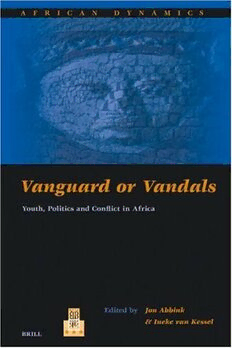
Vanguard Or Vandals: Youth, Politics And Conflict In Africa PDF
311 Pages·2004·2.944 MB·English
Most books are stored in the elastic cloud where traffic is expensive. For this reason, we have a limit on daily download.
Preview Vanguard Or Vandals: Youth, Politics And Conflict In Africa
Description:
This book contains a range of original studies on one of the major challenges in Africa today: the controversial role of youth in politics, conflict and rebellious movements. The issue is not only the drafting of child soldiers into insurgent armies or predatory militias, as in Somalia, Sierra Leone or Congo, but, more generally, that of the problematic insertion of large numbers of young people in the socio-economic and political order of post-colonial Africa. Even educated youths are being confronted with a lack of opportunities, blocked social mobility, and despair about the future. Many of the political antagonisms and conflicts in which youths are involved do not only exist at the discursive level but are being produced by current demographic and socio-political contradictions in Africa. African youth, while forming a numerical majority, largely feel excluded from power, are socio-economically marginalized and thwarted in their ambitions. They have little access to representative positions or political power, which is making for a politically volatile situation in many African countries. The authors address several case studies from across Africa: the Mungiki movement in Kenya, youth agency in southern Sudan in times of war, the challenges of 'reintegrating' youthful ex-combatants in Sierra Leone, and street children in Togo. A common aim is to try to explain why patterns of generational conflict and violent response among younger age groups in Africa are showing such a remarkably uneven spread across the continent and to advance the comparative study of youth and generational conflict beyond mere description of the varied empirical cases.
See more
The list of books you might like
Most books are stored in the elastic cloud where traffic is expensive. For this reason, we have a limit on daily download.
